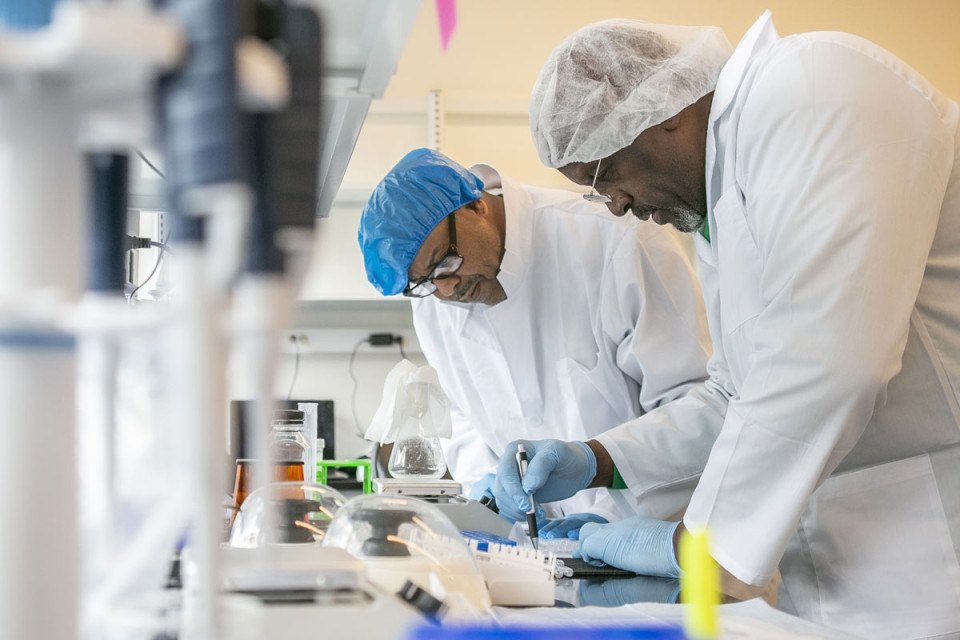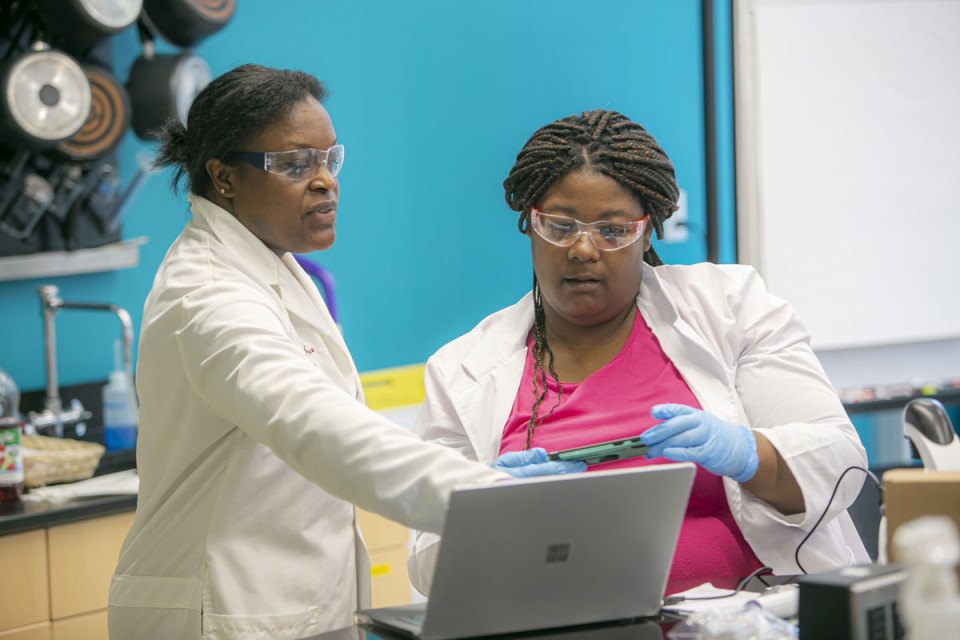3 Ideas To Make Philly’s Life Sciences Boom Benefit All of Philadelphia
The life sciences boom in Philly is crucial to the region's future, but it needs to do more to benefit all Philadelphians. Here are three ways the new administration can cement the city’s role in driving inclusive economic growth.

Participants in the Science Center’s workforce development program “BULB” / Photograph courtesy of University City Science Center
Our city remains one of the world’s most dynamic and productive hubs for healthcare innovation. We have a concentration of world-class healthcare systems, life sciences companies and research institutions committed to supporting the next generation of healthcare solutions being developed by local healthcare startups and entrepreneurs. So much so that the city has been named one of Brookings’ leading ‘Innovation Districts and a Top 30 Global Startup Ecosystem.
Yet, there is still a divide between our healthcare innovation ecosystem and the people who live and work in Philadelphia. The success of our life sciences sector is juxtaposed against vast racial, economic, and health disparities that divide our neighborhoods. While our life sciences industry is world-renowned, the relationship between that economy and local, homegrown talent is too distant.
The city should have a role to play in supporting the inclusive growth of our local life sciences economy. And while it’s been addressed in the agendas of administrations past, there are too many well-intentioned, but disjointed efforts to make a widespread, meaningful impact.
New leadership, however, begets new energy, new ideas, and new beginnings. It is incumbent upon Mayor Cherelle Parker and her leadership team to bridge the chasm between our two greatest assets — diversity and innovation — by cementing the city’s role in driving inclusive growth in our life sciences economy.
Workforce diversity and DEI measurement have been popular talking points. These efforts, however, don’t always have a direct correlation to neighborhoods that have been historically left behind. There are three areas of opportunity where the city can help realize a future of healthcare innovation where all are welcome, at every level: improving STEM education, supporting industry workforce initiatives, and reducing barriers to entry for entrepreneurs.

Tiffany Wilson, president and CEO of the University City Science Center / Photograph by Colibri Workshop
1. Building an Inclusive Economy Starts Early
Building an inclusive and robust economy must start in our schools by ensuring all students have the resources and exposure they need to pursue rewarding careers in Philadelphia. While working with Harrisburg to shore up funding for our schools is the Mayor’s primary role in supporting our school district, there is opportunity to expand that support by making additional out-of-school time (OST) programming widely accessible. OST education fills the gap between classroom and industry, providing exposure and access to creative topics and a diverse array of careers. Many schools that would benefit most from additional out-of-school time programs are so vastly under-resourced that they don’t have the capacity to identify and cultivate external partnerships.
Mayor Parker understands that the city has untapped resources when it comes to unilaterally serving schools. Her administration can create efficiencies within the system to improve support for youth interested in STEM, and can do so by aligning out-of-school time K-12 offerings to local economic opportunities (outlined in the Mayor’s 100-Day Action Plan). Expanding access to Career and Technical Education (CTE) programs would be a strategic place to start, as currently, there are only two programs for life sciences.
2. Shoring Up the Life Sciences Talent Pipeline
Beyond K-12, there is no shortage of opportunities for the new administration to create and support workforce pathways into the life sciences industry, including careers with life sciences and healthcare companies of all sizes.
Every talent pipeline has a “push” (programs and initiatives to fuel workforce growth) and a “pull” (the ability and willingness for employers to tap into that talent pool). It should be as easy as possible for people who are looking for career opportunities in STEM to find a program or resource that is a fit for their skills, ability, and family life, regardless of who they are. Similarly, we need to make it as easy as possible for employers to find qualified candidates.
Mayor Parker’s administration should consider harnessing the city’s Department of Commerce as a two-way street — a convening hub for both training workers and engaging employers. The city can leverage its EDA Good Jobs Challenge award, and the resulting Keystone LifeSci Collaborative, to fully engage the life sciences industry, working hand-in-hand with the sector to implement industry-informed workforce training curricula and design match-making initiatives that pair job seekers with employers. The administration should wave this flag proudly, and sing the praises of industry partners that prioritize hiring Philadelphians.

Dr. Karma Pace, BULB instructor from Harrisburg University (left), with Yamesha Carter (right). / Photograph courtesy of University City Science Center
3. Creating a Culture of Homegrown Entrepreneurship
Finally, so much more can be done to support and encourage local, diverse entrepreneurs in the life sciences. Past administrations have been consistent in their support of the startup economy, but efforts to attract business — particularly out-of-market venture and institutional investors — have been flat. The city needs to shed the stigma of not being a “business-friendly” city and can do so by borrowing strategies from emerging economic hubs like Charlotte, North Carolina, to prosper in a post-pandemic economy that has become digital-first. Charlotte’s model, for example, streamlines regulatory processes for entrepreneurs and places a premium on recruiting in-state talent from North Carolina to the city.
Philadelphia deserves a celebrator-in-chief for our successes — someone who will go beyond the pomp of ribbon-cutting ceremonies to serve as a facilitator and national advocate. Mayor Parker has begun building a solid foundation for supporting and celebrating the efforts of local entrepreneurs by organizing the Minority Business Success team and Business Roundtable within her first 100 days. That work should continue by showcasing the work of our city’s Small Business Development Centers and innovative programs like Venture Café that lower barriers to entrepreneurship and highlight startup success stories.
Bridging the Life Sciences Chasm
These areas of opportunity, if seized by the new administration, will form a bedrock for inclusive economic growth in life sciences and beyond. A public sector that understands its role in fostering inclusive economic growth and is prepared to do it well is the first step toward bridging the chasms that fracture our city.
Tiffany Wilson is the president and CEO of the University City Science Center, Philadelphia’s premier catalyst of entrepreneurial activity, healthcare innovation, and economic growth. She brings nearly two decades of leadership transitioning innovative medical technologies from benchtop to bedside, building partnerships across academia, industry and economic development organizations.


